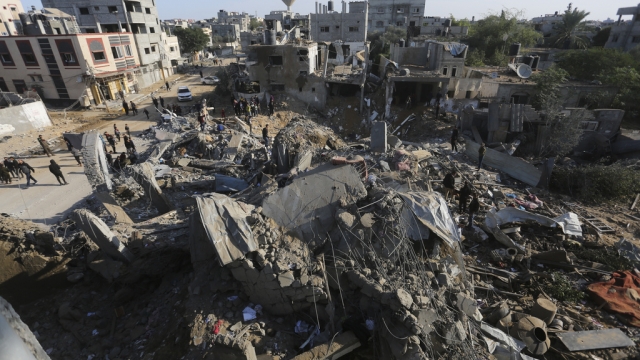The war in Gaza is now entering a new phase as Israeli ground forces focus their fire on the southern part of the territory in their fight against Hamas.
"We our expanding our ground operations against Hamas strongholds throughout the Gaza strip," said an Israel Defense Forces spokesperson in a press briefing.
Satellite images obtained by The Associated Press show Israeli tanks within a mile and a half of Khan Yunis — the largest city in southern Gaza — as troops close in on the ground. Israeli warplanes are softening up targets from above. The Israeli military says it hit more than 400 targets since its weeklong cease-fire with Hamas collapsed last Friday.
In all, nearly 16,000 people have been killed in eight weeks of fighting, with 42,000 injured.
Israel's shift to the south is being met with criticism from the international community. That's because the south, until now, had been the only relatively safe refuge in the 25-mile-long Gaza Strip.
SEE MORE: The humanitarian crisis in Gaza deepens as fighting expands
United Nations Secretary-General António Guterres issued a statement saying there was nowhere for evacuees to go and very little to survive on. Another top U.N. official called the situation in Gaza "apocalyptic."
But Israeli officials say Hamas fighters are in the south, and they're going to be rooted out.
Bullets and bombs are not the only dangers for the residents of Gaza — disease is now also a growing concern.
The World Health Organization says the collapse of civilian infrastructure raises the risk for a wide range of outbreaks, including COVID-19, cholera, measles and tuberculosis. Chronic conditions such as heart disease and diabetes also grow worse without regular treatment.
The WHO says it's critical for shipments of food, water and medicine to continue, but what would really help is a stop in fighting.
"What struck me the most were the children with atrocious injuries, and at the same time, having lost their parents, with no one looking after them," said President of the International Committee of the Red Cross Mirjana Spoljaric Egger. "We have to find solutions to this. We can't turn away from what is, evidently, a moral failure in the face of the international community."
On the other hand, families of the hostages being held in Gaza by Hamas are meeting with Israel's war cabinet later today. They say they are furious, humiliated and they want the government to do more.
There are still 137 people being held in the Gaza Strip, with these families saying they have absolutely no idea of the welfare or the whereabouts of their loved ones. Families of the hostages are calling on the Israeli government to step it up, saying that if it doesn't, they will go to an unspecified international body and ask for help.
This comes as the Wall Street Journal is reporting that Israel is mulling plans to flood the tunnels underneath the Gaza Strip with seawater from the Mediterranean in a bid to flush out Hamas fighters. However, families are extremely worried, saying if this goes ahead, it could potentially harm their loved ones.
Trending stories at Scrippsnews.com



